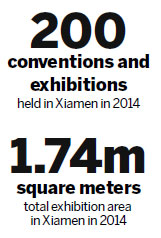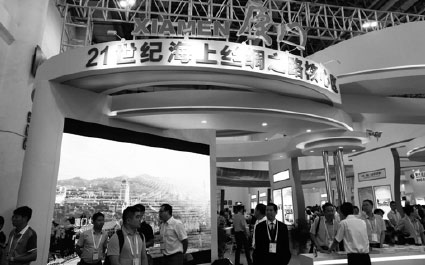Xiamen to regulate exhibition industry
(China Daily), Updated: 2015-11-18
|
More than 50,000 suppliers and buyers take part in the 2015 China International Fair for Investment & Trade in Xiamen. Zhu Xingxin / China Daily |
Xiamen in Fujian province will implement an intellectual property protection regulation for the exhibition business on Jan 1, 2016, in a move to promote the healthy development of the convention and exhibition industry.
The regulation will apply to all exhibitions, conventions, fairs and promotional events held in the city.
According to the regulation, an office will be set up to handle IP complaints at government-organized events and those lasting three days or more or covering more than 30,000 square meters of exhibition area.
At events without complaint offices, the organizers must publish the phone number of the related IP administrative departments that handle complaints.
When people file IP complaints at exhibitions and conventions, the organizer must send details within 24 hours to the individuals or organization that is the subject of the complaint.
If those individuals or organizations do not reply or fail to provide evidence in their support, exhibition organizers must require them to take appropriate measures according to IP laws and regulations. Those who do not take such measures will have their exhibition qualification suspended.

Xiamen is an important convention and exhibition destination in China. In 2014, about 200 such events were held in the city, attracting 4.86 million visits, with total exhibition area reaching about 1.74 million sq m.
In recent years, China's convention and exhibition industry has developed at a fast pace and become an important platform for the construction of modern market system and open economy. Its role in China's economic and social development has becoming increasingly prominent. At the same time, China's convention and exhibition industry still faces many problems, such as a low level of marketization, lack of policies and rules and a lack of international competitiveness.
Earlier this year, the State Council released a guideline to promote the reform and development of the exhibition industry.
Optimizing the market environment, strengthening intellectual property protection and cracking down on infringements and counterfeits were among the highlights in the guideline.
The document notes that exhibition organizing companies are encouraged to develop and use intangible assets such as exhibition names and logos by applying for patents and registering trademarks to improve protection of exhibition intellectual property.
It also suggested that information sharing platforms be set up to better serve exhibition organizers.
In addition, exhibition organizers are expected to shoulder more responsibilities in cracking down on infringements and counterfeiting.
Contact the writers at [email protected]



 +86-592-5302555
+86-592-5302555